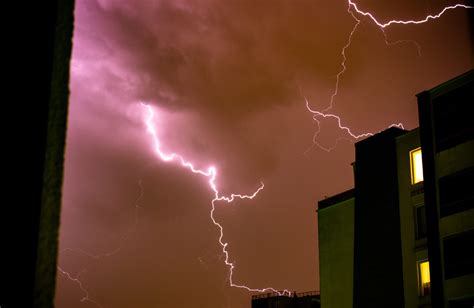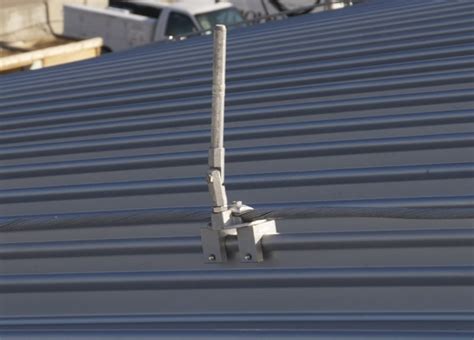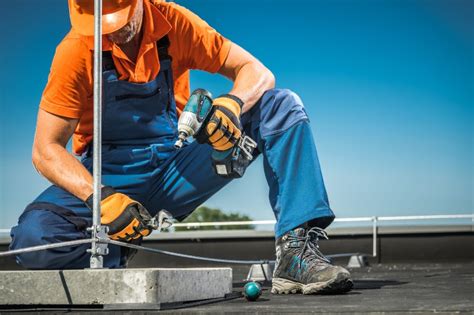do metal house roofs attract lightning To summarize, metal roofs do not attract lightning more than other types of roofing materials. Instead, their conductive properties help to safely redirect electrical charges to the ground, reducing the risk of electrical fires and other hazards. B&R Fabrication was established in 2002 to provide reliable and quality metal fabrication and millwright work directed towards the industrial and agricultural sectors in Southern California. This company is the realization of a father and son partnership, Roy and Brian DeFisher.
0 · will lightning strike aluminum
1 · metal roof reviews and complaints
2 · lightning protection for metal roofs
3 · installing lightning rods on roof
4 · grounding metal roofs from lightning
5 · does stainless steel attract lightning
6 · disadvantages of metal roofing
7 · dangers of metal roofs
$466.74
To summarize, metal roofs do not attract lightning more than other types of roofing materials. Instead, their conductive properties help to safely redirect electrical charges to the ground, reducing the risk of electrical fires and other hazards.While metal roofs don’t attract lightning, they are excellent conductors of .The answer is no. Metal roofs do not attract lightning more than other roofing .
While metal roofs don’t attract lightning, they are excellent conductors of electricity, which is actually a good thing. If lightning does strike a metal roof, the metal can safely .
In reality, metal roofs are no more likely to attract lightning strikes than any other type of roof. When lightning does strike a building with a metal roof, the material's conductivity can actually help disperse the electrical charge . The answer is no. Metal roofs do not attract lightning more than other roofing materials. They are, however, effective in safely conducting the electrical charge from a lightning strike, which can minimize potential damage . As mentioned earlier, metal roofs do not attract lightning. In fact, a metal roof can actually make a lightning strike much less dangerous. As a naturally non-combustible and conductive material, a metal roof with an .
It is crucial to understand that metal roofs do not attract lightning. This myth persists despite substantial evidence to the contrary. Height, Not Material: Lightning seeks the path of least resistance to the ground, typically targeting . Metal roofs do not attract lightning more than other roofing materials. Lightning strikes are determined by the height, size, and location of structures. Metal conducts electricity but does not draw lightning to it. If your home or building has a metal roof and you are inside it during a lightning storm, are you more likely to be in danger? No, in fact, the best thing you can do for your own personal safety during a thunderstorm is to . As we've seen, metal roofs do not attract lightning and can actually provide several advantages during lightning events. Metal roofs possess conductive properties that enable them to channel lightning energy away from .
To summarize, metal roofs do not attract lightning more than other types of roofing materials. Instead, their conductive properties help to safely redirect electrical charges to the ground, reducing the risk of electrical fires and other hazards.
will lightning strike aluminum

Metal roofs do not attract lightning any more than other types of material so getting a lightning rod installed is not necessary. The only time you might want to get lightning rods or a lightning safety system installed is when your home is at the highest point in the area. While metal roofs don’t attract lightning, they are excellent conductors of electricity, which is actually a good thing. If lightning does strike a metal roof, the metal can safely disperse the electrical charge across its surface and into the ground.
arlington electrical outlet box extender
In reality, metal roofs are no more likely to attract lightning strikes than any other type of roof. When lightning does strike a building with a metal roof, the material's conductivity can actually help disperse the electrical charge safely to the ground, reducing the risk of damage. The answer is no. Metal roofs do not attract lightning more than other roofing materials. They are, however, effective in safely conducting the electrical charge from a lightning strike, which can minimize potential damage and increase safety. As mentioned earlier, metal roofs do not attract lightning. In fact, a metal roof can actually make a lightning strike much less dangerous. As a naturally non-combustible and conductive material, a metal roof with an installed lightning protection grounding system provides an easier path to the ground, spreading the force out from the lightning .
It is crucial to understand that metal roofs do not attract lightning. This myth persists despite substantial evidence to the contrary. Height, Not Material: Lightning seeks the path of least resistance to the ground, typically targeting the highest point in an area. Metal roofs do not attract lightning more than other roofing materials. Lightning strikes are determined by the height, size, and location of structures. Metal conducts electricity but does not draw lightning to it. If your home or building has a metal roof and you are inside it during a lightning storm, are you more likely to be in danger? No, in fact, the best thing you can do for your own personal safety during a thunderstorm is to head indoors.
metal roof reviews and complaints
As we've seen, metal roofs do not attract lightning and can actually provide several advantages during lightning events. Metal roofs possess conductive properties that enable them to channel lightning energy away from the structure, reducing the voltage and risk of fire. To summarize, metal roofs do not attract lightning more than other types of roofing materials. Instead, their conductive properties help to safely redirect electrical charges to the ground, reducing the risk of electrical fires and other hazards.
Metal roofs do not attract lightning any more than other types of material so getting a lightning rod installed is not necessary. The only time you might want to get lightning rods or a lightning safety system installed is when your home is at the highest point in the area. While metal roofs don’t attract lightning, they are excellent conductors of electricity, which is actually a good thing. If lightning does strike a metal roof, the metal can safely disperse the electrical charge across its surface and into the ground.
In reality, metal roofs are no more likely to attract lightning strikes than any other type of roof. When lightning does strike a building with a metal roof, the material's conductivity can actually help disperse the electrical charge safely to the ground, reducing the risk of damage.
The answer is no. Metal roofs do not attract lightning more than other roofing materials. They are, however, effective in safely conducting the electrical charge from a lightning strike, which can minimize potential damage and increase safety. As mentioned earlier, metal roofs do not attract lightning. In fact, a metal roof can actually make a lightning strike much less dangerous. As a naturally non-combustible and conductive material, a metal roof with an installed lightning protection grounding system provides an easier path to the ground, spreading the force out from the lightning .

It is crucial to understand that metal roofs do not attract lightning. This myth persists despite substantial evidence to the contrary. Height, Not Material: Lightning seeks the path of least resistance to the ground, typically targeting the highest point in an area. Metal roofs do not attract lightning more than other roofing materials. Lightning strikes are determined by the height, size, and location of structures. Metal conducts electricity but does not draw lightning to it.
If your home or building has a metal roof and you are inside it during a lightning storm, are you more likely to be in danger? No, in fact, the best thing you can do for your own personal safety during a thunderstorm is to head indoors.
lightning protection for metal roofs


array junction box datasheet
array junction box specification
Find your vertical cnc milling machine easily amongst the 688 products from the leading brands (MECANUMERIC, Knuth Machine Tools, ROLAND, .) on DirectIndustry, the industry specialist for your professional purchases.
do metal house roofs attract lightning|does stainless steel attract lightning